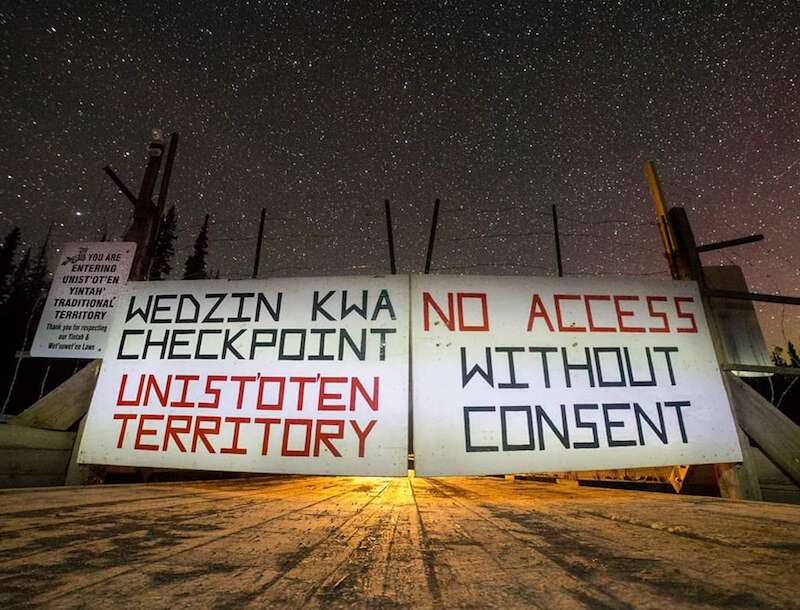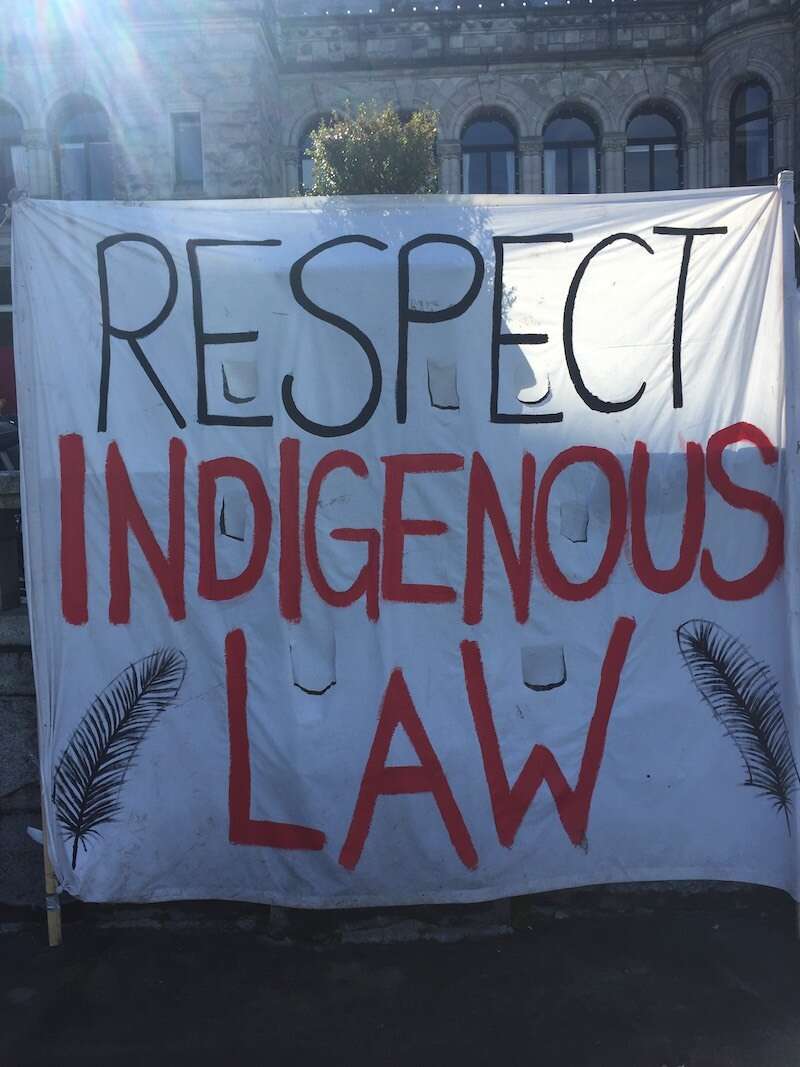In the early months of 2020, headlines across Canada were dominated by the unfolding conflict in Wet’suwet’en territory in northern B.C.
The RCMP’s forcible removal of Wet’suwet’en hereditary leaders and supporters from their ancestral lands to make way for the Coastal GasLink pipeline project sparked solidarity actions across the country, including the disruption of train traffic and the occupation of the provincial legislature in Victoria.
Fast forward three months and media coverage has all but stopped.
The global impact of the COVID-19 pandemic has eclipsed virtually all other new stories. There is little mention of whether the pipeline is proceeding, how provincial and federal leaders intend to address ongoing opposition to the project, or whether the meaningful recognition of Wet’suwet’en title is finally on the horizon.
In light of the above it would be understandable – but inaccurate – to assume that the Wet’suwet’en crisis has abated. Beneath the daily onslaught of coronavirus-related news, the issues which resulted in the conflict over the pipeline project remain unresolved. Below we provide an overview of what happened and what we can learn from the events of early 2020.


What happened
In 2014, the Province issued an environmental assessment certificate to Coastal GasLink approving the construction and operation of a 670-kilometre long natural gas pipeline from Dawson Creek to Kitimat, B.C. over the opposition of Wet’suwet’en hereditary leaders.
Coastal GasLink signed benefits agreements with elected Indian Act bands along the pipeline route. Wet’suwet’en hereditary chiefs and their supporters remained steadfastly opposed to the project.
The pipeline route runs through areas of particular cultural and historical significance to the Wet’suwet’en. It also includes the Unist’ot’en Healing Centre, which provides land-based healing to Indigenous people recovering from intergenerational trauma and abuse.
The Wet’suwet’en Hereditary Chiefs were plaintiffs in the landmark Delgamuukw-Gisday’wa case, in which the Supreme Court of Canada accepted evidence of the Wet’suwet’en hereditary governance system and confirmed that Aboriginal title to lands in Wet’suwet’en territory had never been surrendered or extinguished.
While it stopped short of issuing a declaration of Aboriginal title, the Supreme Court held that the Crown had a duty to enter into good faith negotiations to resolve outstanding issues with the Wet’suwet’en. Over twenty years have elapsed since the decision, but the Crown has yet to recognize Wet’suwet’en title or jurisdiction.
In December 2018, the BC Supreme Court issued an interim injunction prohibiting opponents of the pipeline project from blocking or interfering with construction activities on Wet’suwet’en territory. The RCMP’s enforcement of the injunction order garnered international attention in early 2019.
The issue attracted further attention later that same year when internal communications revealed the RCMP was prepared to use lethal force against the Wet’suwet’en in the course of enforcing the injunction.
A year later, at the end of December 2019, the Court extended the injunction order until the completion of the project. Like its predecessor, the 2019 injunction order includes provisions authorizing the RCMP to enforce the injunction. In response, Wet’suwet’en hereditary leaders issued their own notice evicting the company from their territory.
A month later the RCMP carried out a multi-day operation during which Wet’suwet’en leaders, matriarchs and supporters were handcuffed, arrested and removed from their ancestral lands.
The enforcement operation was immediately followed by a series of solidarity movements across Canada and around the world. Indigenous and non-Indigenous supporters carried out non-violent demonstrations, temporarily disrupted highways and railway lines, and peacefully occupied public spaces including the B.C. legislature.
Throughout the dispute, B.C. Premier John Horgan repeatedly refused to meet Wet’suwet’en hereditary leaders, arguing that the “rule of law” must prevail. At the same time, Indigenous organizations and legal professionals emphasized the importance of resolving the underlying legal issue of who has the right to make decisions on lands subject to unextinguished Indigenous title.
.jpg)

Photo by Jeff Nicholls [Tsimshian]
Recent events
Provincial and federal leaders finally met with the Wet’suwet’en at the end of February 2020. Three days of negotiations resulted in a draft memorandum of agreement on issues related to Wet’suwet’en rights and title. Few specifics about the agreement have been released, other than that it does not expressly address the Coastal Gaslink issue.
Less than two weeks later, the World Health Organization designated COVID-19 a global pandemic. Governments throughout the world enacted sweeping changes to contain the spread of the virus, including significant disruptions to individual freedoms, daily life and economic activities.
In Canada, public attention turned swiftly from concerns about Indigenous rights and self-determination to urgent questions about maintaining public health and safety.
The effect on the Wet’suwet’en-Coastal GasLink dispute was immediate. Large gatherings of people were prohibited, making solidarity demonstrations impossible. Courts drastically reduced their hearing schedules, resulting in the indefinite suspension of numerous legal challenges filed in relation to the pipeline project.
Wet’suwet’en hereditary leaders were forced to find ways for members to review the draft agreement remotely, without access to the feast hall which plays a central role in Wet’suwet’en law and governance. As of April 28th, media sources announced that the Wet'suwet'en had reached consensus to sign the agreement, but that concerns regarding the Coastal GasLink project remain unresolved.
At the same time, public health authorities declared the pipeline project to be an essential service. Construction continues, despite mounting concerns about the increased risk of transmission of COVID-19 posed by transient workers moving to and from remote work camps.
What have we learned?
The COVID-19 pandemic has temporarily diverted public attention away from the Wet’suwet’en-Coastal GasLink conflict. However, critical issues regarding the relationship between the Crown and Indigenous Peoples remain unresolved and will need to be addressed once the current health crisis abates.
In the meantime, we have an opportunity to take stock of what we have learned so far.
First, it is far from clear whether the Coastal GasLink project will proceed as planned in Wet’suwet’en territory. The company’s decision to press ahead with its agenda ignores the multiple levels of uncertainty now connected with the project, including the underlying issue of Aboriginal title, pending court challenges, outstanding permit conditions, and the ever-increasing economic ramifications of the pandemic.
Second, the federal and provincial governments’ responses to the COVID-19 situation underscore that where there is sufficient political will, governments are able to act quickly and decisively to allocate resources and implement creative solutions for complex problems. It will no longer be acceptable for governments to claim that the issues posed by Indigenous title and jurisdiction are too complicated or costly to resolve.
Lastly, the winter of 2020 has revealed the deep commitment on the part of both Indigenous and non-Indigenous people in Canada to work together to achieve justice for the Wet’suwet’en.
Going forward, the public is unlikely to be distracted by specious arguments about Indian Act bands versus hereditary governments, the meaning of “consent” versus “veto,” or the legitimacy of Indigenous law.
The pandemic has given federal and provincial leaders a reprieve, but it will not make the issues which underlie the Wet’suwet’en conflict go away.
Regardless of how long the COVID-19 situation persists, we can expect Indigenous and non-Indigenous people alike to hold their governments to account and take steps to meaningfully recognize Wet’suwet’en title and jurisdiction over their ancestral lands.


First Peoples Law Corporation is legal counsel for Unist’ot’en. The statements here are made on our own behalf and reflect our views on this issue, not those of our client.
Wet'suwet'en Reading List
With so much media coverage of the Wet'suwet'en standoff prior to COVID-19, we thought it would be helpful to collect various articles, blog posts, interviews, case comments, and other resources in one location. We hope it will be a useful tool for anyone wanting to learn more about the situation in Wet'suwet'en territory and Indigenous Peoples’ ongoing struggle for justice in Canada.
View our Wet'suwet'en Reading List.
Kate Gunn is a lawyer at First Peoples Law Corporation. Kate completed her Master's of Law at the University of British Columbia. Her most recent academic essay, "Agreeing to Share: Treaty 3, History & the Courts," was published in the UBC Law Review.
Follow Kate on LinkedIn and Twitter
For more First Peoples Law analysis, visit our blog
Sign up for our Aboriginal Law Report
